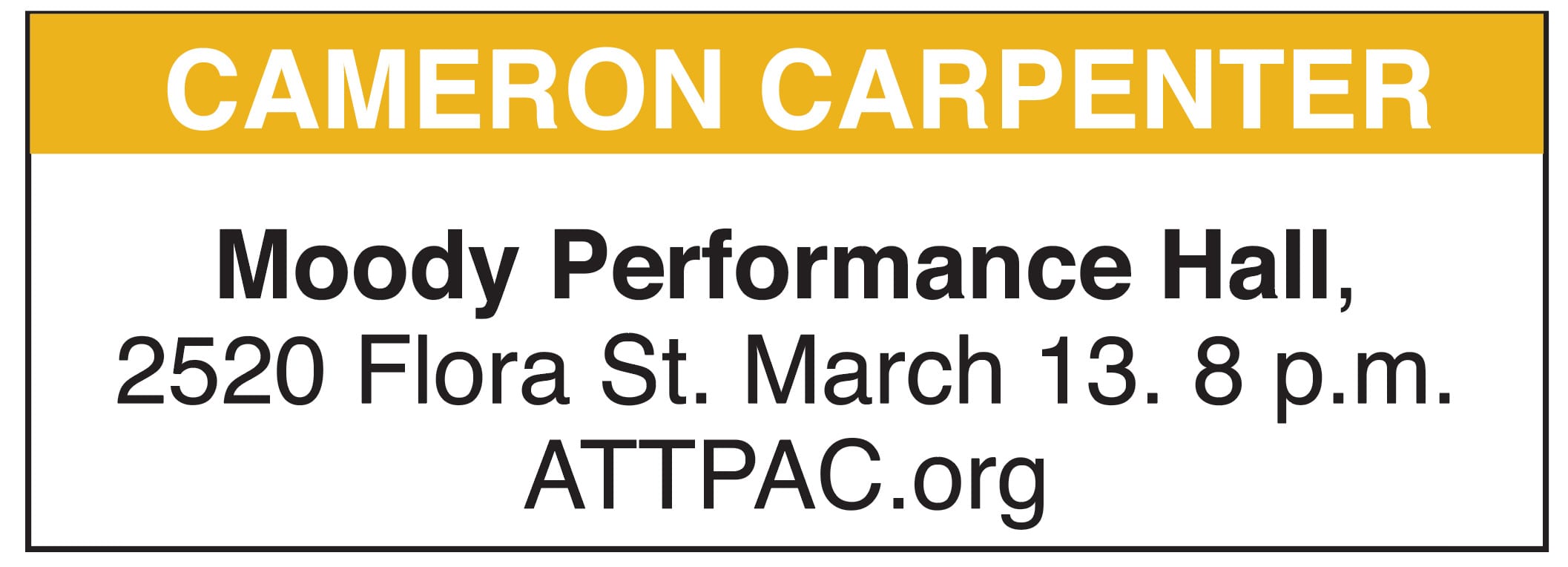We explore the unconventional genius of a cynical classical musician with the soul of engineer
ARNOLD WAYNE JONES | Executive Editor
jones@dallasvoice.com
 With his spiky-punk haircut, bejeweled shoes and attitude of disaffected counterculture, it seemed logical to begin my conversation with Cameron Carpenter — surely the most internationally acclaimed organist since men wore powdered wigs — about whether he considered himself a pop musician working with a classic instrument, or wholly part of the classic music community?
With his spiky-punk haircut, bejeweled shoes and attitude of disaffected counterculture, it seemed logical to begin my conversation with Cameron Carpenter — surely the most internationally acclaimed organist since men wore powdered wigs — about whether he considered himself a pop musician working with a classic instrument, or wholly part of the classic music community?
Perhaps I should have begun with a trigger warning.
Carpenter, still boyish-looking in his mid-30s, responds to that question with strings of analytics in the manner of a late-career college professor lecturing to a philosophy seminar of precisely one student.
His vocabulary surely speaks to the fruits of an effective liberal arts education. (He holds a master’s from Juilliard for starters.) Dismissing the suggestion that the organ and the piano share any musical DNA, he scoffs, “They are informationally different. The fact they both have keyboards seems like a planned distraction, a peacocking intended to trick you into thinking that they are in the same genus, when they aren’t even in the same phylum.” Transcribing music for the organ is an act of “emotional compliance, handling data separately yet maintaining the same meaning.” At one point during our conversation, he starts riffing about how “the identity of the organ is its ability to change its identity,” eventually going deep into the weeds of how an organ’s goal is to solve musical conundrums with an alacrity of logic that, I confess, left me lost as to his point.
Doesn’t matter. Whether his discourse represents high-functioning enigmatic intellectualism or mere nonsense, speaking with Carpenter is fascinating.
He’s cynical and demonstrative, intellectual and impassioned, a musical powerhouse who disparages many of his own talents while criticizing others in his field… and for the cherry on top, identifies as bisexual. He is, simply put, a paradox… which is itself a word that recurs often when he talks.
The classic music “industry,” as he calls it, is a paradox. The organ as an instrument is a paradox. His role within that community is a paradox, too. If, in Scott Fitzgerald’s dictum, the evidence of intelligence is holding two conflicting ideas in one’s mind simultaneously yet retain the ability to function, then Cameron Carpenter is a genius.
Breaking rules — whether with a journalist or in his chosen field of musicianship — seems to be Carpenter’s default setting. He waxes lovingly, almost romantically, about the massive organ that he plays with enviable energy. And why shouldn’t he? He created the whole damn thing from scratch.
“It’s a massive system that travels in the largest possible size of tractor trailer,” Carpenter crows. “It’s a 66 channel, roughly 44 kilowatt system that operates from a mainframe of three computers synchronized and [breaks down into] six pieces. It travels with a complete theatrical wardrobe and maintenance tool shop as well as a kitchen. And I designed it all myself.”
You might not expect a musician who pays the bills touring the world’s concert halls to act like an engineer preoccupied with his instrument’s shipping, but don’t forget about that paradox thing. Cameron Carpenter, at a fundamental level, doesn’t give a shit about touring. Or making music, for that matter. He’s just in love with how an organ makes music.
“Ultimately, I’m more interested in the instrument than in the music itself — more interested in my role as a designer and music theorist than as a musician,” he says. “My playing is a demonstration of my design, not a performance. You go to listen to a great violinist or a great vocalist or harpist, and [chances are] they have a relationship with that instrument — they will have played it naked and in moments of despair and drunk and for recordings and in rehearsals. So the handshake promiscuity of playing [any old] pipe organ [just doesn’t interest me]. I have to husband my organ, to keep it alive, and that’s sort of my challenge in life at the moment. It’s why I have a laissez-faire attitude about the repertoire — the music fundamentally does not matter to me. The music is the point, I suppose, of a concert, but for some people [like me], the instrument is the point.”
If it sounds like Carpenter has a complex, love-hate relationship with classic music, you’re catching on. He only begrudgingly concedes that, like it or not, he is part of the firmament of classical music by training and discipline… at least for the time being.
“Many is the time that I indeed wish that I could say I was part of another musical community. But there is no remote possibility to say convincingly I am a part of the rock scene. I am a dyed-in-the-wool classic musician,” Carpenter sighs. “Some of the cynicism I have is that my identity is part of my resignation at being part of the classical system. But I don’t accept the status quo. And I’m now in a position to speak my mind about the way I work.
“Inevitably, the industry is in a paradox,” he continues (that word again!). “There has never been more music made at a higher level, but even putting it mildly, [it’s simply a fact] that classic musical is in its decline. Who could pretend otherwise?!? When people think of classical music today, it doesn’t come from the 1870s, but from the 1950s. The idea that a little outreach could regenerate the era from the end of World War II until the 1980s [in ludicrous]. That ship has sailed. The end of classical music is part of classical music, though on a small scale it is totally alive. It’s apparent to me in my daily work that not only won’t I not be doing it for the rest of my life, but there’s a high probability I won’t even be doing it in a few years.”
That he did it at all is something of a miracle. The idea that an organist could have an international career and that they would play the same organ — one they personally designed, which is also their practice instrument — is a strange proposition. “The organ imposes irreversible, non-negotiable, mathematical tenets on the player,” he says. “The more creative and disruptive ways to operate the organ’s tonal ways, you’re still submitting to the system. It’s like how you can’t tickle yourself. Which makes it challenging and alluring. There’s something about the relationship that’s slightly perverse. I’m flying my own spaceship way out from where it was meant to be. It’s the organ of my dreams.”
And despite the harmonies his playing creates, sounding as orchestral as a fully-staffed philharmonic, Carpenter is a soloist — a solitary status he enjoys.
“The organ is an anti-collaborative instrument, as I understand it and I don’t consider myself collaborative. I prefer to be alone musically,” he says. “I’m not even remotely at the level of [classical musicians like Lang Lang] in terms of talent or reputation and there’s no remote possibility my career will reach that level. I guess it’s OK that I don’t feel like I have a lot in common [with such musicians]. I think a lot are music-driven, and that’s just not my experience. I don’t mean to begrudge or bemoan anything, but my experience with classical music is the life of an engineer, revolutionized by the organ I designed.”
And with that Carpenter dashes off to have breakfast. Even a genius has to eat.

